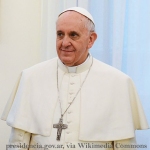 As Pope Francis enters Holy Week, the most important week of the Christian year, just days after his installation as Pope, the world watches his every move. “What kind of leader will he be?” we wonder. “Will he focus on issues that are important to me? Will he contribute to corruption in the church or lead it toward reform?”
As Pope Francis enters Holy Week, the most important week of the Christian year, just days after his installation as Pope, the world watches his every move. “What kind of leader will he be?” we wonder. “Will he focus on issues that are important to me? Will he contribute to corruption in the church or lead it toward reform?”
As I’ve watched Pope Francis this past week, Ronald Heifetz’s teaching about leadership has come to mind. In Leadership without Easy Answers, Heifetz defines a leader as one who focuses on values. A leader, he says, helps groups face conflicts in values and confront the gap between their espoused values and lived values. A leader creates and sustains a “productive zone of disequilibrium” in which people feel pressure to do the work they must do to live out their values. Like a pressure cooker at the right temperature, the “productive zone of disequilibrium” creates the right amount of pressure for the work to get done. Too little pressure and nothing happens. However, just as excessive pressure will cause a pressure cooker to explode, too much disequilibrium will push a group over the edge and prevent members from working together productively.
Is Pope Francis staying within the productive zone of disequilibrium? What values is he calling to our attention? In taking the name Francis, the Pope identified poverty, peace, and the environment as values he shares with St. Francis of Assisi. He has already been manifesting these values by mingling with the people (a nightmare for his security team), and by announcing that he’ll hold the Holy Thursday service this week in a youth prison (where he will wash the inmates’ feet) instead of at the imposing St. John Lateran church where it is usually held. Furthermore, his Palm Sunday homily yesterday focused on humility and simplicity. He has also reached out beyond Catholicism’s borders, identifying interfaith dialogue as another important value.
It’s too soon to tell whether Pope Francis will stay within the productive zone of disequilibrium. He is using the window of opportunity of his first days in office to put his priorities on the table and enlist others to work with him. Will he push too fast? Will he build a strong team to accomplish his goals? Will he overcome factions in the church? How will his spirituality inform his leadership?
If Pope Francis stays within the productive zone of disequilibrium, he may accomplish important reforms in the church today, just as his predecessor, St. Francis of Assisi, did in the twelfth century. If he backs off, the pressure may be too low for anything to change. If he pushes too hard, the pressure cooker may explode, with the factions fighting among themselves. May he find just the right level of pressure to help the people grapple with the important values he has articulated. The church and the world desperately need what he has to offer.
















